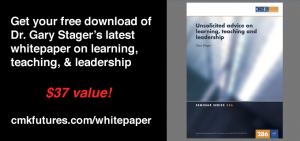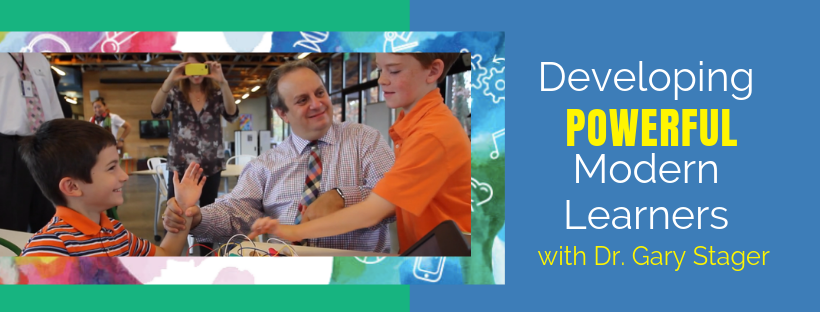“Things take longer to happen than you think they will, but then they happen faster than you thought they could.” – Al Gore
As summer 2019 draws to a close, I am left with a sense of renewed optimism. It feels as if there is a growing appetite for the sort of progressive, constructionist, child-centered, Reggio inspired, project-based I have advocated for over my entire career. The popularity of our book Invent To Learn: Making, Tinkering, and Engineering in the Classroom, interest in the other books we publish, and the success of the Constructing Modern Knowledge summer institute contributes to my optimism. I spent much of August working in three different schools that are unapologetically progressive. They embrace things like project-based learning, no grades, multi-age grouping, authentic assessment, learning-by-making, and computing as an intellectual laboratory and vehicle for self-expression. I have not enjoyed this level of fun and meaningful work since I led professional development in the world’s first laptop schools, started one of the first camp computer programming programs, or collaborated with Seymour Papert on my doctoral research, when we created a multiage, project-based, alternative learning environment for incarcerated teens.
Recent news accounts detail how the children of the Koch Brothers are creating a progressive school in Wichita, Kansas, called Wonder. Even if that school and its potential spinoffs are the polar opposite of the obedience schools for other people funded by the Kochs, the mere recognition by rich people that progressive education is preferable (at least for their children) may be viewed as a small victory.
EduTwitter and education articles are awash in ideas with progressive intent. Unfortunately, much of the escalating volume of half-baked and often terrible advice dispensed is shallow, ahistoric, or just plain wrong. However, even impoverished or disingenuous notions of student voice, reflection, metacognition, choice, centers, exhibitions of work, Montessori education, agency, making, etc. are evidence of a growing desire for progressive education.
We may also see a demographic shift in the expectations for schooling by millennials who entered kindergarten the year No Child Left Behind was enacted and are now coming to grips with the costs of an impoverished educational experience focused on standardization, testing, and narrowing of the curriculum. Their K-12 education was distinguished by constant test-prep, teacher shaming, charter and privatization schemes, elimination of electives, and dismantling of arts programs.
Their teachers’ preparation was focused on animal control and curriculum delivery, absent practice in the art of teaching. Tens of thousands of Teach for America interns were thrown in front of a classroom after being handed a backpack of tricks and greeting card messages about “what a teacher makes.” Whole language, classroom centers, interdisciplinary projects, authentic assessment, pleasure reading, play, integration, and even recess were flickering flames in the heads of teachers old enough to remember the seventies. Donald Graves, Frank Smith, John Holt, Lillian Weber, Maxine Greene, Herb Kohl, Ken and Yetta Goodman, Ivan Illitch, Bev Bos, Vivian Paley, Loris Malaguzzi, Dennis Littky, Deborah Meier, and Ted Sizer have been erased from the common language of educators. Award-winning school administrators congratulate themselves for their discovery of TED Talks on the hotel room TV during one of the many school discipline conferences. Sound educational theory has been replaced by “I believe.”
Hey Stager, I thought you said there was room for optimism? Those last two paragraphs are pretty brutal.
There is now, and will be for the foreseeable future, more demand for progressive education than there is supply.
The children of the first Millennials are now entering school. This emerging generation of parents will greet the schooling of their children with a hunger for a different educational diet than they experienced, even if they have no idea what that might be. Those of us who know better, need to do better. We need to create clear and distinguishable options for parents yearning for a creative, humane, and joyful educational experience for their children. I assert that the demand for progressive education already exceeds supply and will continue to grow.
Remarkable new materials and software are creating opportunities not just to teach things we have always wanted kids to know, but are granting students access to new knowledge domains, ways of knowing, and creative outlets unimaginable just a few years ago. Such objects-to-think-with help realize a modern sustainable form of progressive education.
The challenge: When the Koch Brothers and progressives value the same quality of education for their children, doing the right thing for all children might not only be viable, but on the right side of history. Imagine if the world awakes from its slumber and suddenly desires the kind of educational system many of us dream of. How would we meet the demand? Who will teach in that fashion? Who will teach the teachers? Where does one begin?
My recent work reminds me that even in schools fully committed to progressive ideals, we are building the plane while flying it. Regardless of the quality of their preservice education, teachers love children and want to be liberated from the shackles of compliance. Schools will need to educate children, their teachers, and the community all at the same time if they wish to invent a better future. You cannot visit this future, watch a video about it, or tweet it into existence. No amount of education tourism is a substitute for you and your colleagues taking the controls, confronting your compromises, and doing the right thing.
Issues to address as a community
My work in progressive schools has helped me identify a list of issues schools need to address in any attempt to realize their aspirations. Essential conversations are ongoing and essential, but must accompany bold, meaningful, and reflective practice.
Where do we begin?
- Projects
- Teaching for democracy
- Independence and interdependence
- The value of learning stories
- Honoring childhood
- Removing coercion, competition, and antagonism from the classroom
- Interdisciplinary projects are not a mash-up but are rooted in reflective practice.
- The importance of whimsy, beauty, and fun
- Computer programing as a liberal art
- The value of school R&D
Making the case for project-based learning
- What is a project?
- Projects as the curriculum, not a culminating activity
- Teaching in a project-based environment
- How do you know a kid is learning?
What happens in a progressive classroom?
- The limits of instruction
- What if a kid isn’t interested in a particular project?
- Connecting to student interests
- How long should a project last?
- Classroom centers
- Shaping the learning environment
- Teacher as researcher
Curriculum
- How do I satisfy “the curriculum” without teaching it?
- How skills and knowledge emerge from projects
- The power of themes
- Finding the balance between student interests and the responsibility to introduce children to things they don’t yet know they love
- Why the constructive use of computers is non-negotiable.
- Lessons from the Reggio Emilia Approach, El Sistema, constructionism, and other progressive traditions
The issues involved in realizing the ideals of progressive education are subtle and incredibly complex. They may even be impossible, but such aspirations are beneficial and worthy of a relentless pursuit.
Piaget “teaches us that knowledge is a consequence of experience.” If we wish for teachers to teach differently, they need to experience learning in new ways. If we want parents to support our progressive efforts, they too need to experience learning in different contexts.
We’re not clairvoyant and can’t predict what the future holds. We do however know a great deal about how to amplify the potential of each teacher and learner. I intend to dedicate the rest of my days making schools more productive contexts for learning so that each school day may be the best seven hours of a kid’s life.
I look forward to helping many more schools stand on the side children, perhaps even yours.
Please reach out if you are interested in PD, speaking, consulting services, family workshops, or school residencies.
Gary S. Stager, Ph.D.is an award-winning teacher educator, speaker, consultant and author who is an expert at helping educators prepare students for an uncertain future by super charging learner-centered traditions with modern materials and technology. He is considered one of the world’s leading authorities on learning-by-doing, robotics, computer programming and the maker movement in classrooms. Dr. Gary Stager is co-author of Invent To Learn — Making, Tinkering, and Engineering in the Classroom and the founder of the Constructing Modern Knowledge summer institute. He led professional development in the world’s first 1:1 laptop schools and designed one of the first online graduate school programs. Learn more about Gary here.
Veteran educator Gary Stager, Ph.D. is the author of Twenty Things to Do with a Computer – Forward 50, co-author of Invent To Learn — Making, Tinkering, and Engineering in the Classroom, publisher at Constructing Modern Knowledge Press, and the founder of the Constructing Modern Knowledge summer institute. He led professional development in the world’s first 1:1 laptop schools thirty years ago and designed one of the oldest online graduate school programs. Gary is also the curator of The Seymour Papert archives at DailyPapert.com. Learn more about Gary here.



Gary, thank you for the optimistic message along with the healthy list of ideas we could start focusing on in schools.
Excellent, as always. Thanks for the focus and the optimism. Take care!